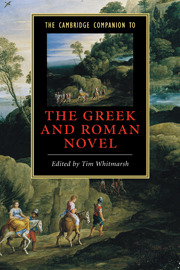Book contents
18 - Novels ancient and modern
from Part IV - Reception
Published online by Cambridge University Press: 28 June 2008
Summary
Many people brought up in English-language educational systems are under the impression that the modern novel is a mid-eighteenth-century development. In fact, a rich tradition of novels and attendant literary theory originated in continental Europe as early as the end of the sixteenth century and continued into the seventeenth century. Part 1 of this chapter focuses on the impact of the ancient Greek novels on the development of extended prose fiction, that is, the novel, in parts of early modern western Europe. During that period continental European novelists, especially in France, were learning from ancient Greek novelists how to construct extended, complex, plot-driven stories in prose, and literary theorists were explaining how to achieve 'heroic' tone and fashion 'heroic' prose narratives in the mould of epic poetry. By the end of the seventeenth century the lessons of narrative manipulation and the creation of appropriate tone had been learnt fully in much of western Europe. Beyond that point these features had become so thoroughly naturalised in the novels of western Europe that it becomes impossible to distinguish between direct imitations and adaptations on the one hand and imitations of imitations on the other hand.
- Type
- Chapter
- Information
- The Cambridge Companion to the Greek and Roman Novel , pp. 299 - 320Publisher: Cambridge University PressPrint publication year: 2008
- 5
- Cited by



